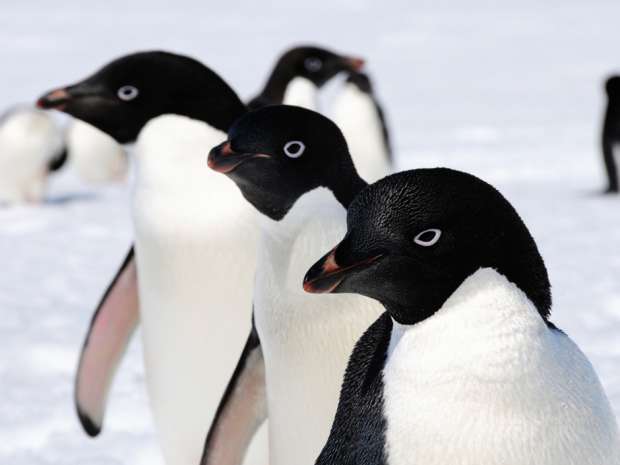(February 19, 2016) It’s a familiar theme. Global warming is killing off penguins, just as it decimates polar bears. Yet this time, most of the world’s press wasn’t buying it, even though Adélie penguins — they’re the one with the tuxedo look — are every bit as adorable as polar bears.

A scientific study released in Feb. 2016 says an estimated 150,000 Adelie penguins have died in Cape Denison, Antarctica in the five years since a giant iceberg blocked their main access to food. Natacha Pisarenko/AP Photo file.
This article, by Lawrence Solomon, first appeared in the National Post
“150,000 penguins have disappeared in Antarctica. Thanks, climate change!,” ran the sarcastic headline this week in Grist, the online environmental magazine.
“Researchers found that a colony of Adélie penguins in Antarctica’s Cape Denison has decreased from 160,000 to just 10,000 since 2011, when a huge iceberg ominously named B09B became grounded in nearby Commonwealth Bay. The penguins were once a short waddle from their food source, but the arrival of the iceberg — which is nearly the size of Rhode Island — has turned that jaunt into a 75-mile round trip.”
Grist was reporting on a study in Antarctic Science by the University of New South Wales’ Climate Change Research Centre that blamed the penguins’ disappearance on global warming. As professor Chris Turney, an author of the study, told the Australian Broadcasting Corporation, “Under a warming planet we might anticipate more icebergs in the Southern Ocean and so these events might become more common.”
It’s a familiar theme. Global warming is killing off penguins, just as it decimates polar bears, spreads deserts, acidifies oceans, triggers hurricanes and gets fingered for most every other plague to visit the Earth. Yet this time, most of the world’s press wasn’t buying it, even though Adélie penguins — they’re the one with the tuxedo look — are every bit as adorable as polar bears.
“Why have 150,000 penguins mysteriously disappeared?” This headline in The Christian Science Monitor did not offer global warming as the answer; the story didn’t so much as mention global warming. Instead, the Monitor focused on the claim that, because of the iceberg, foraging trips were longer, “the chicks were fed less often and meal size was reduced as the adults required more of the food obtained to meet their commute to and from the colony.” The Monitor also found newsworthy Turney’s emotes at the devastation he surveyed: “I don’t think any of us anticipated what we saw: The ground was littered with dead chicks and discarded eggs. What had been until recently a noisy, raucous colony was now eerily quiet. It was heartbreaking to visit.”
This was, in the Monitor’s view, primarily a story about nature, not about the Climate Change Research Centre’s claim that man was destroying it. Secondarily, it was a story about how climate change scientists can be thick-headed when they wade into areas outside their discipline, in this case penguin science.
Turney’s scene of devastation may have broken his heart, and been entirely unanticipated by his crew, but to scientists who know something about penguins it was a ho-hum event. As explained by Michelle LaRue, a penguin population researcher at the University of Minnesota, penguin carcasses don’t decompose in the Antarctic cold, meaning all Adélie penguin colonies are always littered with dead birds and discarded eggs. The Monitor even discounted whether a mass die-off occurred at all.
No one found 150,000 penguin carcasses so there’s no reason to think they died, LaRue explained. More likely, they did what penguins usually do when their environment changes — they adapt by joining other colonies. That’s what happened a decade ago when another iceberg, B-15, put a different colony at risk. Because its penguins happened to have been marked for study, scientists could follow them as they moved between colonies.
Other major media similarly ignored the Climate Change Research Group’s global warming claims, including our CBC. It ran this headline: “150,000 Adélie penguins presumed dead after giant iceberg blocks access to food.” That was followed by the sub-headline: “But they may have just moved elsewhere.” Discovery News was even more dismissive of the climate alarmists’ work. Its headline: “‘Dead’ Antarctica Penguins Are Probably Fine.” Said the Weather Network: “Adélie penguins colony crash may not be a die-off.” And London’s Daily Mail: “150,000 ‘dead’ penguins may simply have walked somewhere else.”
Even when media outlets countenanced the possibility that climate change played a part in the penguin mystery, they downplayed a role for humans. CNN cited a 2015 peer-reviewed study in Bio-Med Central Evolutionary Biology that cautioned against placing much weight on current events by noting that the melting of glaciers determined the Adélie population over millennia. “We found that the Adélie penguin population expanded 135-fold from approximately 14,000 years ago,” the 2015 study found, because glaciers melted, providing “an increase in ice-free ground suitable for Adélie penguin nesting.” Contrary to Grist’s sarcastic headline, the Adélie penguins — if given a say — might be thankful for some global warming.
Lawrence Solomon is executive director of Energy Probe, a Toronto-based environmental group. Email: LawrenceSolomon@nextcity.com.








